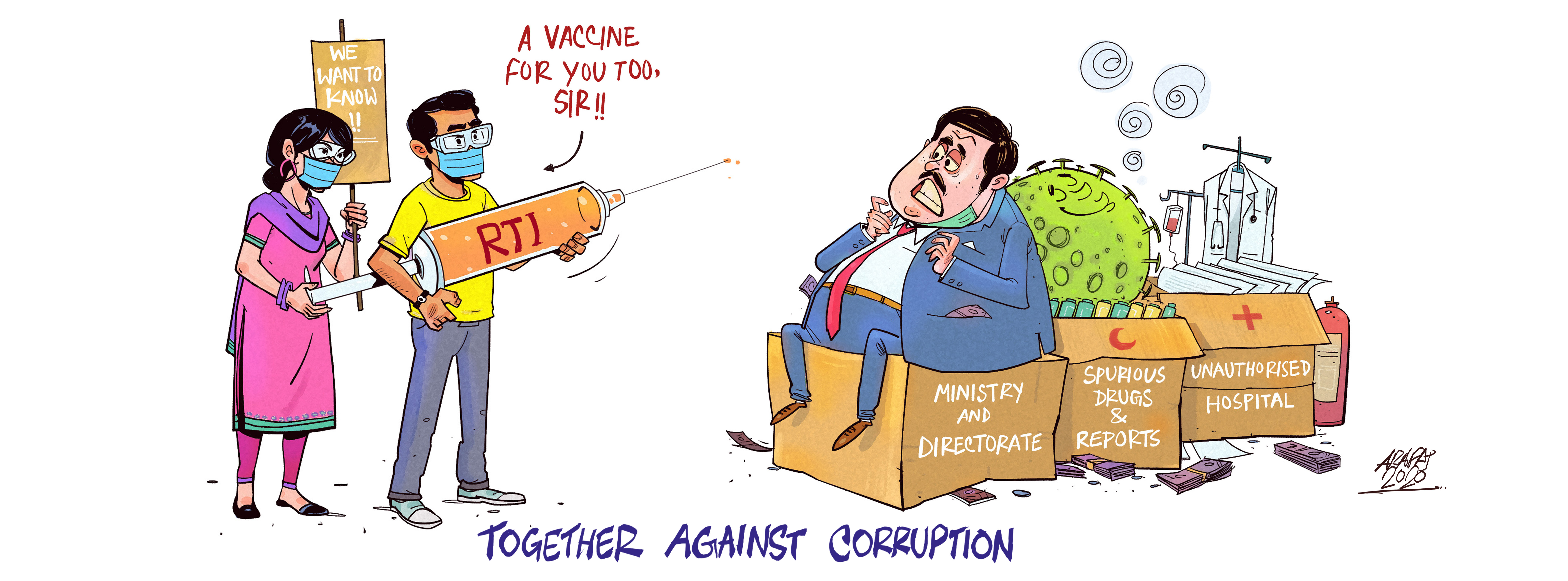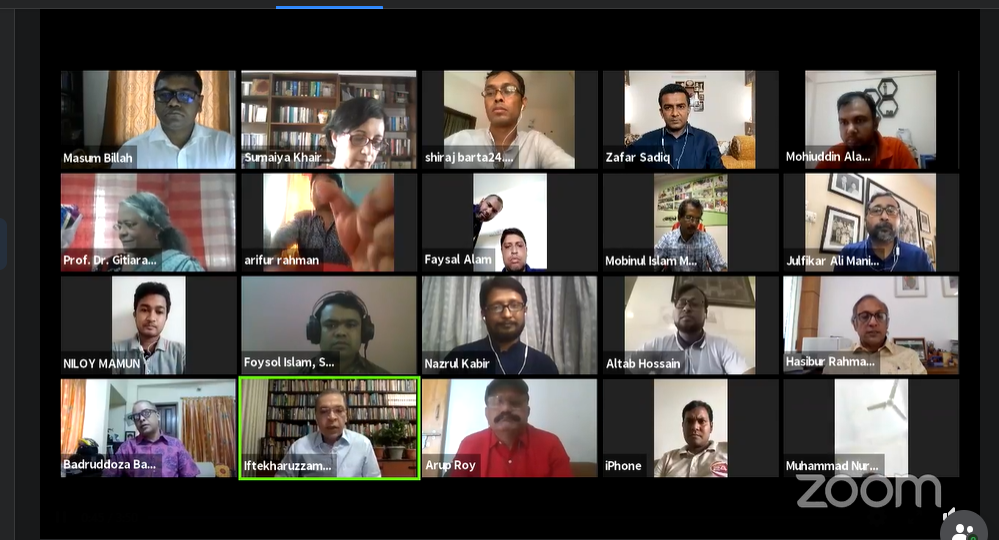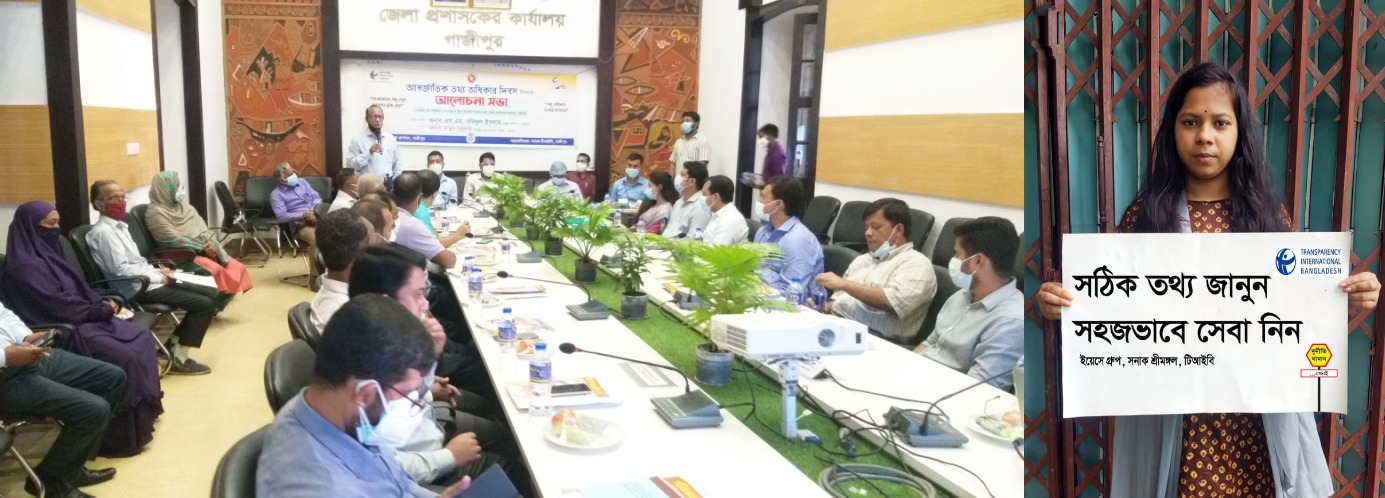Published: 28 September 2020

TI Bangladesh celebrated the international Right to Know Day with great enthusiasm. As the COVID-19 pandemic has underscored the significance of access to information more than ever, this year, TI Bangladesh’s observance specially focused on to the right to information in times of crisis.
Marking the Right to know day on 28 September, which has also been observed globally as International Day for Universal Access to Information, TI Bangladesh called upon the government to formulate and implement effective policy strategies to ensure effective and reliable flow of information in times of crisis; thus allowing greater access to government-held information.
With the theme তথ্যের অধিকার, সুশাসনের হাতিয়ার; তথ্যই শক্তি, দুর্নীতি থেকে মুক্তি (Right to information is a tool of good governance; Information is power to get rid of corruption), TI Bangladesh chalked out week-long events to observe the day both at national and local level. Besides holding online-based youth-led campaigns and discussion meetings to encourage citizens about applying their rights to get information, TI Bangladesh organised a high-level virtual open discussion on “Right to Information, Freedom of Expression and Investigative Journalism: Bangladesh Perspective” on 28 September.
Md. Masum Billah, Deputy Programe Manager- Outreach & Communication, TIB presented the keynote paper which analyzed the current situation of right to information, freedom of expression and investigative journalism in Bangladesh. The panel discussants highlighted that most of the media nowadays are producing similar news with slight changes in headlines. Some media consider themselves as allies of the ruling party. Furthermore, political influence and pressure in different forms including indiscriminate misuse of the highly disputed Digital Security Act, widespread media capture and the lack of courage to some extent, have affected journalists negatively. Instead of being investigative, these adverse trends have been turning journalists away from actual journalism. They are not adequately prepared, and the media owners are not interested to arrange necessary trainings for the journalists. The overall situation resulted into people losing trust and confidence on media. To regain public confidence and trust, the journalists need to challenge the traditional structure through professional integrity and courage. To mitigate the division and gap created_at among the government, media owners and journalists, the experts stressed on strategic investigative journalism through ensuring professional safety and collective efforts against all types of evil forces.

“While the government is to be applauded for enacting the Right to Information Act, the mentality of a section of the government in implementing this law is - 'Information is government property'; and the government will publish as much information as it wants. At the same time, in many cases, the disclosure of information has become a risky issue as some sections of the political and administrative powers lack courage to face criticism,” said Dr. Iftekharuzzaman in the meeting.
Criticizing arbitrary use of digital security act, Dr. Zaman termed such practice as a matter of great national and international concern. “This pressure on the media is alarming and in effect it has been creating irresistible obstacles to democratic accountability, the establishment of integrity and the prevention of corruption.” Emphasizing the significance of skills, honesty, trust and confidence of the journalists against all odds, the media also needs to be vocal together with the civil society in demanding freedom of expression, speech and opinion as recognized by the Constitution, and put pressure on the government and other stakeholders to ensure a conducive environment for journalism, concluded Dr. Zaman.
In the meeting, eminent Media Researcher and Social Activist Professor Afsan Chowdhury, Professor of Department of Mass Communication & Journalism, Dhaka University Dr. Gitiara Nasreen, Planning Consultant of Boishakhi Television Julfikar Ali Manik were present as the panelists. Sheikh Manjur-E-Alam, Director-Outreach & Communication, TIB conducted the meeting while Professor Dr. Sumaiya Khair was also present at the meeting. Among others, representatives of different media, development organizations, and aspiring journalists attended the event.
Following the discussion meet, TI-Bangladesh announced Investigative Journalism Awards 2020 to 4 journalists and a team of journalists for video documentary. Details of the winners and the winning news items and documentary can be found here. Winning Journalists of each category will receive a cheque worth of BDT 1 lac twenty-five thousand, a crest and a certificate of honor; while the winning documentary will receive cheque worth of BDT 1 lac and fifty thousand, a crest and a certificate of honor.

At local level, in 45 locations of the country, members of the Committees of Concerned Citizens (CCCs), YES, YES Friends and SWAJAN members observed the Right to Know day with variety of engagement programmes i.e. discussion meetings with public offices, online seminars, campaigns, video-drama presentations etc.
In the discussion meetings with the public offices, CCCs shared survey findings with the local offices, carried out by Civic Engagement division, TI Bangladesh with support of CCCs across the country along with YES, YES Friends and SWAJAN members that focused on the information disclosure scenario at the web portals of public offices at both Zilla (District) and Upazilla (Sub-district) levels. The survey covered availability of published information under seven indicators i.e. notice Board, news, information on public services, office chiefs, designated officers, officials and how to contact the authority in need. 1954 offices at Zilla level and 188 at Upazilla level under the survey were mainly the public-service delivery offices i.e. Offices of the Deputy Commissioners, Superintended of Police, Fire Service, Ant-Corruption commission, Social services, Primary education, Civil surgeon, Information, Hospitals, Local police etc. CCCs also placed 7-points recommendations at each of their areas to make the web portals more effective and citizen-friendly, including official steps to ensure publishing updates, awareness raising campaigns to encourage citizens to access information through web portals etc.
Throughout the series of programmes during the celebration, TI Bangladesh placed 13 points recommendations including formulation and implementation of effective policy strategies to ensure effective and reliable flow of information in times of crisis; vigilant focus towards increasing usage of digital tools to facilitate information disclosure and access to information; bring political parties, media and business entities under RTI Act; amendment of certain provisions of contradictory laws with RTI act and laws ensuring people’s right to information, speech and expression such as Digital Security Act; ensure necessary legal protection of information seekers in the act etc.
TI Bangladesh played an instrumental role in the enactment of the Right to Information Act 2009 adopted in the Parliament on 29 March 2009, which became operational in July 2009. TIB has been observing the RTK Day since 2006, as the first organization to do so in Bangladesh.







